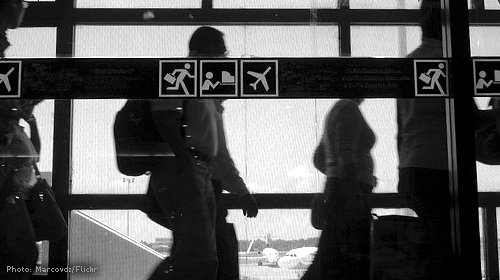The Constitution Applies When the Government Bans Americans From the Skies


The government does not have the unchecked authority to place individuals on a secret blacklist without providing them any meaningful opportunity to object, the ACLU argued in a brief filed last Friday with the federal district court in Oregon.
We made the filing in Latif v. Holder, our lawsuit asserting that the government violated the Fifth Amendment due process rights of 13 Americans, including four military veterans, by placing them on the No Fly List and refusing to give them any after-the-fact explanation or a hearing at which they can clear their names.
Our brief highlighted the utter irrationality of the government's No Fly List procedures. The plaintiffs in Latif all flew for years without any problems. But more than two years ago, they were suddenly branded as suspected terrorists based on secret evidence, publicly denied boarding on flights, and told by U.S. and airline officials that they were banned from flying¾perhaps forever. Each of them asked the government to remove them from the No Fly List through the only "redress" mechanism available—the Department of Homeland Security Traveler Redress Inquiry Program. But the government has refused to provide any explanation or basis for their inclusion in the list. Our clients have been stuck in limbo ever since.
We submitted evidence to the court showing that the No Fly List burdens our clients' constitutionally protected liberties, with devastating consequences for their personal and professional lives. It deprives them of the ability to fly—an essential means of travel in modern life. It also stigmatizes them as suspected terrorists, although they have never been charged with any crime, let alone convicted of one.
Our brief argued that the Constitution's core promise of procedural due process requires the government to provide at least some explanation and some hearing where Americans can defend themselves after it deprives them of their liberties. The government's categorical refusal to provide either is unconstitutional. We explained:
Defendants' refusal to provide the bare rudiments of due process stems from their embrace of an explicit policy—known as the "Glomar" policy—of refusing to confirm or deny any information concerning a person's status on the No Fly List. The Glomar policy and Defendants' inadequate process cannot be reconciled with governing due process doctrine. Courts routinely require notice and some form of hearing for much less severe deprivations of liberty than Plaintiffs have suffered. Thus, the government cannot suspend a student from school for ten days, or recover excess Social Security payments, or terminate state assistance for utility bills without some kind of notice and hearing.
In its own brief to the court defending its "redress" program, the government's arguments boiled down to two sweeping—and extraordinary—claims. First, according to the government, the Constitution has nothing to say about the adequacy and fairness of the procedures the government provides Americans to challenge their inclusion on the No Fly List because "alternatives" to flying are available. We countered that argument in a separate brief (also filed on Friday) showing that the government relied on the wrong law, and by providing evidence confirming what is obvious: the No Fly List so severely restricts Americans' ability to travel that it triggers due process rights. Not only does the list ban Americans from the skies, it even bars them from travel on boats. As a result, two of our clients have been effectively banned from traveling from the United States to be with their families in Ireland and Yemen.
The government's second sweeping claim is that even confirming or denying No Fly List-status (much less actually providing notice of the reasons and basis for inclusion in the list) will cause a parade of national security horribles, including the disclosure of sensitive or classified information. Our brief, however, showed that this argument is based on a fiction: all of our clients already know they are on the No Fly list; they were each prevented from flying and explicitly told that they are on the list. We also pointed out that the mere possibility that sensitive national security information might be involved is no reason to categorically foreclose the hearings that due process requires.
Americans have a right to know what kind of "evidence" or innuendo is sufficient to land them on the No Fly List, and to have a hearing where they can defend themselves. Without this bare minimum, there is no meaningful check to correct the government's mistakes or ensure that it uses the blacklisting power it claims fairly and appropriately. We are asking the court, therefore, to vindicate a basic yet fundamentally important proposition: a government black list that denies Americans the ability to fly without giving them an explanation or fair chance to clear their names violates the Constitution.
Learn more about the No-Fly List and other civil liberty issues: Sign up for breaking news alerts, , and .

